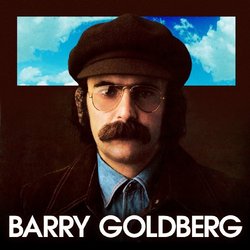The Windy City Cowboy Rides Again
Steve Roeser | 03/27/2010
(5 out of 5 stars)
"Barry Goldberg has been flying under the radar forever, the man who always seemed to be there in the thick of things, quiety, unobtrusively making the engine hum, keeping the wheels turning, while the spotlight was often trained directly on...somebody else.
Goldberg's self-titled album from the early '70s was finally HIS chance to shine, after years of supporting people with names like Buddy Miles, Jimi Hendrix, and his longtime hometown Chicago compatriot, Mike Bloomfield.
Bob Dylan produced this album for him because Dylan regarded Goldberg as a friend, ever since Bloomfield, Goldberg and Al Kooper had helped him start this new thing called "Folk-Rock" when Dylan decided to play an electric set at the 1965 Newport Folk Festival. (Goldberg had also played with Bloomfield on Kooper's classic "Super Session" album in '68, after leaving the Electric Flag, a great but short-lived band he'd started with Bloomfield.)
But when Goldberg's album came out, around 1974, Rolling Stone magazine panned it, knocking Goldberg for his singing. Barry had always been known primarily for his brilliant piano and organ work, and for his record-producing, but he was not a bad singer, by any means. What happened, Goldberg explained years later, was that the late Jerry Wexler (who was a friend, a great record producer, and someone who wanted Goldberg to succeed) insisted that the vocals needed to be re-recorded, after Goldberg had worked closely in the studio with Dylan.
"Bob told me, 'Leave the vocals just like they are, they're fine. Don't let anybody mess with them.' They had a vibe to them," Goldberg recalled.
But Wexler, who had the power to do so, came in and told Goldberg they had to re-work the vocal tracks, and that's where things took a wrong turn. "It's bothered me all these years," Barry said. "Here I had this great opportunity to work with Bob, to have him produce me--which he never did for anybody, ever--and it just didn't turn out right."
In 2009 Goldberg was given the chance to remix the album using the Dylan-produced vocals that they'd recorded along with the assembled musicians right there at the Muscle Shoals studio, and the record has finally come out on CD for the very first time. And here's the most remarkable thing of all: "Barry Goldberg" is a fabulous album.
It is clearly a lost classic from an era in rock when there was "something in the air," and gifted musicians like Goldberg had the ability to capture that ephemeral "something" in their music. Call it magic, because that is quite possibly precisely what it is, and what we're hearing.
Of the 13 tracks here (there is an unlisted final track, the beautiful "Dreamin'," plus two other previously-unreleased songs, whereas the original vinyl album only had ten songs, and those with the Wexler-produced vocals that Goldberg didn't feel good about), there is not a single weak one.
Goldberg, the "Illinois Boy" he sings about in "Orange County Bus" (one of two songs written with Gail, Barry's "Big City Woman," who is still his wife), shines once more throughout this great collection, with his songwriting, his keyboard playing, and yes, with his singing, too, which is honest and heartfelt.
The songs "It's Not The Spotlight" and "I've Got To Use My Imagination" were written with the great lyricist Gerry Goffin, former husband of Carole King and one half of the legendary pop songwriting team, Goffin & King. These songs became hits for other artists (in the case of "Imagination," a very big hit for Gladys Knight & The Pips) around the time that Barry first recorded them.
But Goldberg is certainly no slouch when penning his own lyrics to his music, as he does on three of the best tunes here, "Minstrel Show," "Stormy Weather Cowboy" and "She Was Such A Lady." The last named tune is one that Dylan himself ought to consider recording for his next album. One might wonder if, when Goldberg first played it for him, Dylan thought to himself, "Hmm, this song sounds like something I would write..."
That figures, because Barry was surely open to learning whatever he could from Dylan's early music ("early" as in mid-Sixties to mid-Seventies) and from Dylan's many songwriting successes. That's aside from the fact that NO songwriter of that era, whether personally-acquainted with him or not, could help being influenced by Dylan.
The inspiring "Stormy Weather Cowboy" ("Try and remember, hope isn't dead...") and the self-effacing, lay-it-all-out-there ballad "She Was Such A Lady" are definitely two of Goldberg's greatest songs.
If you love classic rock, you will love "Barry Goldberg," an incredibly musical album, with all those great Muscle Shoals musicians backing Barry, and even Dylan himself singing background vocals on certain tracks. If there was a better reissue of an album in 2009, I know nothing about it.
The Stormy Weather Cowboy rides again."


 Track Listings (12) - Disc #1
Track Listings (12) - Disc #1